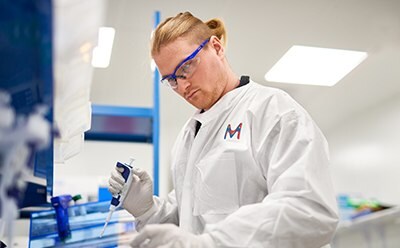Merck Launches First All-in-One Genetic Stability Assay to Accelerate Biosafety Testing
NEWS RELEASE
- Proprietary Aptegra™ platform reduces five assays to one
- Results in 66% faster testing time and significantly lower cost for clients compared to traditional methods
- Only platform that meets all regulatory requirements to establish CHO genetic stability with a single test
 Darmstadt, Germany, April 16, 2024 – Merck, a leading science and technology company, has launched the first all-in-one, validated genetic stability assay of its kind. The Aptegra™ CHO genetic stability assay leverages whole genome sequencing and bioinformatics to significantly accelerate biosafety testing for clients and therefore, their move into commercial production.
Darmstadt, Germany, April 16, 2024 – Merck, a leading science and technology company, has launched the first all-in-one, validated genetic stability assay of its kind. The Aptegra™ CHO genetic stability assay leverages whole genome sequencing and bioinformatics to significantly accelerate biosafety testing for clients and therefore, their move into commercial production.
“Driving innovation in biosafety testing is essential to bringing new therapies to patients faster,” said Benjamin Hein, Head of Life Science Services, Life Science business of Merck. “CHO genetic stability testing has remained relatively unchanged for many years. The Aptegra™ platform transforms biosafety testing with a digital solution using next-generation sequencing.”
Currently, FDA guidance requires biotech companies to use multiple assays to address genetic stability requirements. This traditional package of assays is costly, time-consuming, and often results in data that need additional interpretation and support. The Aptegra™ platform addresses these pain points by replacing five different assays and four different technologies with one assay utilizing the next-generation sequencing technology platform. This approach reduces testing time by 66 percent and reduces costs by 43 percent compared to traditional methods. The platform meets all regulatory requirements for genetic stability assurance, including copy number assessment.
Merck has made significant investments over the last five years to expand its biosafety testing capabilities for clients across the globe. The company’s global biosafety testing network includes sites in Shanghai, China; Singapore; Stirling and Glasgow, UK; and Rockville, MD, USA.
The Aptegra™ digital platform adds to a transformative portfolio of digital technologies developed by Merck. In December, Merck launched AIDDISON™, an AI-powered platform that integrates generative design with predictive synthesis planning, allowing rapid identification of promising candidates and reducing risk of late-stage failures. Additionally, Merck offers a first of its kind Bio4C® Software Suite, which combines data analytics and visualization, automation, and control software for GMP manufacturing.
About Merck
Merck, a leading science and technology company, operates across life science, healthcare and electronics. Around 63,000 employees work to make a positive difference to millions of people’s lives every day by creating more joyful and sustainable ways to live. From providing products and services that accelerate drug development and manufacturing as well as discovering unique ways to treat the most challenging diseases to enabling the intelligence of devices – the company is everywhere. In 2023, Merck generated sales of € 21 billion in 65 countries.
Scientific exploration and responsible entrepreneurship have been key to Merck’s technological and scientific advances. This is how Merck has thrived since its founding in 1668. The founding family remains the majority owner of the publicly listed company. Merck holds the global rights to the Merck name and brand. The only exceptions are the United States and Canada, where the business sectors of Merck operate as MilliporeSigma in life science, EMD Serono in healthcare, and EMD Electronics in electronics.
最新新聞稿
若要繼續閱讀,請登入或建立帳戶。
還沒有帳戶?